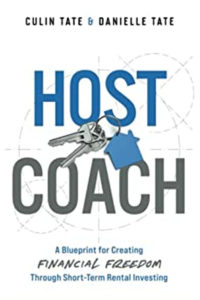How do you turn your short term rentals into a profitable part of your investment portfolio? In this episode of Ice Cream with Investors, Culin Tate, owner and host of 9 Airbnb properties, Airbnb Ambassador, short-term rental coach, author of Host Coach, and speaker, talks more about the regulations that you need to consider before investing in short-term rentals. He also shares tips on how little touches can go a long way to making your vacation rentals feel like home. Listen in and turn your STRs into a vehicle towards real estate success!
—
Watch the episode here
Listen to the podcast here
4 Pillars To Win In Short Term Rentals… And The Regulations You Need To Consider With Culin Tate
We have Culin Tate, who is going to talk to us about short-term rentals. Culin is a serial entrepreneur, owner, host of 9 Airbnb properties, Airbnb ambassador, a short-term rental coach, author of a bestselling book, and a speaker. He’s on a mission to share his experience, knowledge, and specific tools and software and systems he has created to capitalize on this short-term rental opportunity that’s in front of us. Short-term rentals are a topic that I get a lot of questions about, and I’ve explored and not explored, and then explored it again. I’m super excited to have Culin on the show. Welcome to the show, Culin.
Thank you, Matt. I’m excited to be here.
We like to start with a difficult questions here. What’s your favorite ice cream?
I’ve got a good answer for that. My son makes homemade artisan peanut butter. He started to make ice cream and mix the peanut butter into the ice cream, and it’s to die for.
I love peanut butter and I love ice cream. If you saw the look on my face, I was already into it with homemade peanut butter.
I’d love to send you a pint.
We’ll find a way. Where there is a will, there’s a way. When you make it at home, do you throw any toppings into it or is it just the peanut butter in the ice cream?
It’s got a couple of flavors with the peanut butter. There’s like a cinnamon sugar one, a honey vanilla one. Yeah, they have their own flavor to them.
He makes more than just peanut butter? He’s got all these different flavors too?
He makes these different flavors of peanut butter.
I love it. I don’t know your son, but I want to be your son’s friend now. Tell our audience, what’s the scoop? What do you do now?
I am an Airbnb host, and through that attracted attention from friends and family. They were interested in what I was doing and seeing some of the success that we were enjoying. That led me into becoming a coach and to share my specific processes. Beyond my friend group, I work with a lot of real estate agents and their clients as a coach. Then coaching, you say a lot of the same things in presentations. The presenting and speaking led me to write a book, Host Coach: A Blueprint for Creating Financial Freedom Through Short-Term Rental Investing.
Where did your real estate journey begin?
I have always been interested, intrigued and excited about real estate. I bought my first condo, my first home. When I moved out of it, I rented it and bought another condo. That just never worked for me, the long-term thing. Every end of the year, it was paint and carpet and that kind of stuff. I never saw any real appreciation. My son was about four years old, and anybody who is in this spot, you want to get out of the house and get a new perspective. We bought a cabin. Then again, friends wanted to stay there and then friends of friends wanted to stay there, so we put it on Airbnb, and that was back in 2015, 2016.
It immediately did really well. All of a sudden it’s booking every weekend, weekdays are filling in. That started to pop a light over my head, which is, “There’s something here.” I’ve always wondered, “Where are the deals from our generation?” You hear these stories about your grandparents or your parents, they bought this vacation house, and we missed the boat as a generation on that. It quickly came to light that I think that short-term rentals is that opportunity for our generation to create wealth and financial freedom.
That’s why I think there’s a huge opportunity for it now. Where was the cabin located?

Short Term Rentals: If your intentions are short-term rental, make sure that the property clears all state, city or county and homeowner regulations.
8 of my 9 places are in the Shenandoah Valley, which is kind of part of the whole Blue Ridge Mountain chain. In that whole Blue Ridge Mountain chain, the cabins are all the same. You can go on Airbnb and pick any destination. It’s not a huge mountain, but it has great views. You get all these cabin locations pop that have been there for years, mainly as people’s family getaway places, that now people are seeing the opportunity to purchase and repurpose for short-term rentals.
You started with the one. How quickly was it until you bought the second one of them?
The impetus there was I sold a company in 2018, and I’ve never had a W-2. I was scratching my head about what my next endeavor was going to be. I had that one cabin and it was doing really well. I could see the numbers on it. I ended up that summer of 2018 buying three cabins. I didn’t really set out to buy three. I bought one and then it needed work. Then I looked at this other one and then there was an off-market deal. Just happenstancely, I jumped into it knowing that the numbers would work. I know that I could invest and make a career out of it, so to speak.
Momentum brings opportunity too. I think it’s funny when you start moving actions and towards a certain things, you find that momentum actually brings you more opportunities than if you weren’t involved in it at all.
It really does. You hear people say that all the time, but I definitely experienced it when I first got a couple of short-term rentals. Probably half of my properties have come off market just because of that. The second last place I bought was referred to me because a guy wanted to sell his house and was talking to his boss, who I had bought something from, and he called me. That’s a real example of the momentum that happens when you put yourself out there.
I know in your book, you talk about the four pillars of short-term rental investing. I’d like to cover those. Could you give us what are the four pillars that you teach in your short-term rental investing?
First is Find Your Where. The second is Make It Pop. The third is Price For Occupancy. The fourth is Rank For Authority.
Let’s go through those. Find your where, I’m assuming that’s about finding the right location. Is that right? Talk us through that one.
Short-term rentals are a little different than just multifamily, for example, where it doesn’t matter where the deal is. There’s a component of hospitality that comes with short-term rental. I tell people, “Find a place that you wouldn’t mind spending some time.” I recommend that people start within 2 or 3 hours’ drive from where they live, and there’s going to be a place where you would like to go for the weekend. Where would you take a spouse for an anniversary? Where would you like to spend some time with friends? That’s how I ended up in my location. I’m a fly fisherman. I used to go down to the Blue Ridge Mountain areas to fly fish. Find a place that you can be passionate about, that you don’t mind spending time, because that passion will show in your hospitality.
That’s one of the things I think you teach different than a lot of other folks that I’ve had on the show, or that are into this space in general is you want to find a place that you’re passionate about, that you can sell essentially because you’ve been there and you like the experience. A lot of people will tell you, “Google the top ten places and all this kind of stuff.” While that’s great, there’s going to be demand there. There are also going to be a lot of folks trying to go in there and be in that market as well.
I’ve heard you talk about there’s a market for everything. If you are into a specific thing, so does someone else, and because you found that specific thing, it means someone else found that as well. The Shenandoah Valley is a perfect example, but probably not a lot of folks know where that is, especially if they’re not from Blue Ridge or the Virginia area. When you said that, I immediately know where that is just because of how beautiful it is.
Anywhere mountains, lakes, rivers, winery areas, the beach to some extent, wherever people like to go. Particularly post-COVID, people are not just getting out of their house for a long weekend. They’re getting out of their house now to change environment. You can work from home but it doesn’t have to be your home.
We didn’t talk about this before the show, but I’m actually looking at that right now. I was like, “I’m tired of being in my home. I want to live somewhere else for a month and work from there because I have that ability to do that.” I’ve always wanted to live in New York City or Chicago, or one of the bigger cities on the East Coast. I’m looking at that right now, so you read my mind there.
A few years ago, my wife and I, at the time our son was going into fifth grade, picked up and moved to Athens, Greece.
What does Make It Pop mean?
Make It Pop is about your decorating and décor, cleaning the place up, making it look crisp and inviting and unique, the interior pops of color, great decor. Then capping that off, topping on the ice cream is professional HDR photos, because your guest is going to buy simply on the photos that you take.
The overarching goal in creating a good vacation home experience is to provide your guests something that they don’t have at home.vCLICK TO TWEET
On a long-term rental, chances are you’re going to see it, and the tenant is going to see it before they go in and move in there. Whereas for a short-term rental, they really are buying on the location and the photos on there. I think the photo piece is often overlooked. It does make it pop for other folks when they have nice photos.
There’s even an SEO component to it, a Search Optimization component to it, which is when Airbnb decides which listings to show, it wants to show the listings they get clicked on and therefore it get booked. If you’re doing a search and you can see 10 listings but 1 of them has this magnetizing photos, and that’s why we say HDR photography, you’re going to be compelled to click on that because it stands out so much sharper than every other photo, even if they are professional photos.
I’ve got to ask this question. This is one of the questions I took to make sure I ask you since I’ve got an expert on the phone here. Some people say the weirder, the better. Meaning, when you’re doing an Airbnb, you want to make it so weird, like half the people say, “Absolutely not,” but the other half say, “Heck yes,” and are willing to pay whatever they can to spend a night there. What are your thoughts around that?
I have mixed thoughts on that. I don’t know about the weirder, the better, but I will say the more unique, the better. There are unique things. You can be creative with short-term house. I know listings that are teepees at a farm, yurts, streamline campers. That’s a good segue to your audience who might be thinking about getting into this. You might not have to go out and buy a $500,000 home. You might be able to buy a $20,000 lot or even lease a lot, something like that, and put a little pop-up type. I have this picture of these little trailers. They’re just little trailers, an Airstream, literally teepees and yurts and things like that, geodesic domes. It’s not necessarily the weirder, the better, but you can be creative and get in at a low cost with some of those creative options.
Leasing out a lot is something I heard someone do, which I was like, “That’s genius. For $200 a month, you could go lease out somebody’s yacht and a lot.” There are plenty of people that would love to have a “camping experience” that they know is safe and secure and all that kind of stuff, but not be too far off the reservation. I like that idea. I’ve also heard like put in something that’s Instagram-worthy Airbnb. It’s like a pink wall or something that people would go post a picture and put it on Instagram, TikTok or Snapchat. That way it drives inorganic traffic too.
We bought this property as one of those first three that I mentioned. In the backyard, there was a shed, but it had electricity to it. We started thinking, “What can we do with it? Do we make like a yoga room or this?” We basically turned it and it’s called the garden bar. We reroofed it and put some linoleum down. We put a bar in there and a dartboard, and a leather couch that we got off of Facebook. It’s like a little bar area that we repurposed for a couple hundred dollars.
The third one is Price Per Occupancy. What does that mean?
Price Per Occupancy refers to keeping your place booked. A lot of people when they start out, “We’ll just pick a base price, we’ll just pick a fixed price,” and say, “I think I can get $200 or $230 a night.” The first part of that is doing away with the fixed pricing. We use a tool called PriceLabs, which is a third-party dynamic pricing tool. It’s very inexpensive, and it attaches to your Airbnb account. It knows the exact number or the amount of demand for any given day for listings in your area.
If you put in that $200 price, it’s going to maybe turn that down a little bit on the weekday and weigh up on weekends, holidays, special events, so that you’re not leaving money on the table. When you do that fixed pricing approach, you’re underpricing your weekends and overpricing your weekdays. Then you end up like, “I feel good. I’ve got 60% occupancy,” but you can only make money when the place is booked. Your booking platform is going to show you higher if you’re making more guest revenues, service revenues for them.
I have a good friend that’s into this space. One of the things he talked about like when you first put a property online too, you want to make the price so attractive that people book it because they’re going to look at bookings. With those bookings, chances are, you’re going to get some reviews. With the reviews, automatically you look better and things like that. Is that a strategy you would recommend for somebody that’s just listing a property for the first time?
Absolutely. I do a lot of near-term discounting, so not just when the property is new. Let’s say you have a new property. What I would do is I would go in and discount not the next 2 months, but the upcoming 2 or 3 weeks. You get the booking velocity going. Then I have rules set up in PriceLabs or I’ll do it manually. If I’ve got an opening that Tuesday and Wednesday night, I’m going to discount that more than normal to get it sold, to get the revenue, and to teach the algorithm that our listing is one that had showed high because we can create that booking velocity and revenues for the platform.
One of the things that’s running at the topic of occupancy, how have you seen your occupancy change since COVID? Specifically what I’m looking for is, are you seeing more shorter term stays but more frequent, or longer term stays and less frequent? Do you have any anecdotal experience around that?
The length of stay really hasn’t changed in my market. My length of stay is like 2.3, 2.5 days. My occupancy hasn’t changed either because I always have priced for occupancy. What has changed since COVID is the average daily rates that we’ve been able to attract have gone up, because there is so much more demand. Those are both weekdays and weekends. The base rates have gone up probably 20%, 30% since COVID.
We’re recording this on May 4th 2022, and Airbnb just reported earnings. They talked about 70% increase in revenue year-over-year, so I think that speaks to the demand for sure.
As we were saying, it’s not just the weekend hikers now, it’s people. I think the world has changed the way we work and the way we embraced experience. I think we all reshuffled our priorities a little bit after being stuck at home for a year.
Your last one is Rank For Authority. I’m assuming that’s some of the SEO stuff we’ve been talking about. Could you help us understand what that means?

Short Term Rentals: Make it really clear to your insurance agent that you intend to be using the property for short-term rental use. It’s a little different than just a renter’s insurance for a long-term lease so it needs to be written on a commercial policy.
The idea there is to either manually or through software, I use a software called Rankbreeze that tracks where your listing is being shown in search results. There could be 300 properties in a market, but keeping an eye on where you’re showing up in that listing, in that search result, Airbnb has to decide which properties to show in what order. The average user maybe views four properties before making a purchase decision.
It’s like going on Google, if you’re looking for something on Google, how often do you go past the first page? You usually find an answer in the first couple of clicks. Maybe not the first click, maybe shop 2 or 3 clicks. Airbnb’s search engine is just like that. You need to keep an eye on your placement, and you can affect your placement through pricing, through optimizing your policies, changing things like your instant booking settings and your cancellation policies, amenities, things like that, to make sure that you’re staying in that top 10.
The other side of that equation, if you’re always number one, that’s the authority part. Now my listing has an authority, and it’s a good signal that you could probably start to raise your prices. Before Rankbreeze, a lot of that was a lot of guesswork, but now we’ve got this great tool that will track and monitor for us our exact placement on an automated basis.
I don’t want to breeze over the software stack, and I want to make sure we get a chance to ask that. You talked about PriceLabs, I’ve heard AirDNA as a competitor. You’ve talked about Rankbreeze. What are the other software that you use to run your operations?
It really starts with the research. From a research side, AirDNA is the gold standard. If your audience are looking and are interested in this and want to be in Nashville, Tennessee, you can subscribe to that market. AirDNA will give you a lot of data. They’ll tell you regulatory scores, investability scores. They will tell you average daily rates, average occupancies and seasonality, things like that. You can subscribe to that for any market. If someone is looking to get started, they know where they want to go, subscribe to AirDNA. That’s how you can start underwriting the deal and understand what the performance would be. AirDNA is the first tool that is a must-have. From there, we talked about PriceLabs for pricing.
The next in line, equally important to those above, is an automated messaging tool. I use Hospitable. That takes a lot of the day-to-day work out of being a host. It automates your new booking, messages, inquiries, your check-in information. It also starts with being a five-star host. When someone books one of my properties instantly with Airbnb, they get a nice detailed email that comes automatically from Hospitable that says, “Here’s everything that you might need to know about planning your trip.” Then five days before the trip, they get another automated message that says, “Here’s how to get there. Here are the house codes. Here are the Wi-Fi codes, all that kind of stuff.” As a host, you are only answering the real specific question. It takes a lot of the heavy lifting time out of posting.
One of the challenges I think about in this space, and I’ve heard people talk about in this space, they don’t want to get calls at 11:00, 12:00, people locking themselves out and things like that. Does Hospitable take those frequently asked questions and help with that as well? Or do you have systems or VAs or anything helping you on the backend with stuff like that?
They do have a bot. I don’t use it. It will answer FAQs like that, but that is a fear. I don’t get calls at 11:00 at night. When I go to bed, my phone stays in the living room. I don’t take it with me. It’s never a problem. I might get a message at 9:00 at night, but I never get midnight messages. I know hosts that are real clear about that like, “I’m not reachable during these hours,” but I don’t even do that. People just don’t have that many emergencies. We use digital locks. I think that solves for the biggest of the emergencies like, “I lost the keys and locked myself out.”
Let’s talk through regulation. I mentioned before the show that I’m in Nashville. Nashville has gone through history of it’s legal, not legal, “It’s legal but only in these certain parts, and it’s not legal in these parts. Now we’re making these parts illegal.” It fluctuates so much on the regulations that it’s frustrating for me to want to get involved in this space. I know I live in the most perfect market for Airbnb because of the tourism traffic that we have. How are you seeing, thinking about or coaching through the regulation piece?
The first thing to take into consideration before making an offer on any property is that regulation can happen at many levels. It can happen at the state level, the city or the county level. It can even take place at the homeowner association level. Make sure before you place an offer, if your intentions are short-term rental, that the property clears all three of those hurdles or boundaries. Additionally, I make my investments in areas that have a history of the property being used for short-term rental. A lot of the regulation comes from areas that aren’t used to that, and regulators have to figure out a means to deal with people who have concerns about short-term rentals. Sometimes that comes in the form of completely banning short-term rental use.
Sometimes it comes in the form of you need to go through a permitting process, which isn’t objectionable. Maybe we have to get the house inspected. Maybe you have to pay $100 a year for a business permit because it is a commercial activity. Thirdly, it would be taxed. In the area I’m in, we pay a small occupancy tax. That’s my preferred solution because if you’re in an area that already has a hospitality tax collected, it’s unlikely that the authorities in that area are going to go from collecting a tax base to outlawing something.
That’s the similar answer I would give to regulation. I would go to these markets where their whole economy is built off of short-term rentals and tourism. I know Gatlinburg is two and a half hours away from me. It’s a popular Airbnb short-term rental market right now, probably too popular and oversaturated for me to want to get involved in. One of the things about that town is they were doing short-term rentals back in the ’60s and ’70s. Their whole economy is based on that. They’re not just going to outlaw short-term rentals because that would mean wiping out their entire market. I liked the idea of looking at localized markets that are outside of these cities, where you’re not competing for long-term rentals. You’re competing against hotels. At that point, I don’t think many counties would want to ban it.
That’s a good nuance too. It’s places where the hotels are strong in inner cities. Is it the community that’s fighting for short-term rental regulation or is it maybe the lobbies? I wouldn’t want to be in the hotel business these days
You’ve talked us through automation. You’ve talked us through some of the regulations. The next big objection that I hear commonly is this idea of what if somebody comes in and damages your property. I know that Airbnb and all the major platforms have a million-dollar policy for some types of issues there. How do you think about managing damage to your property or insurance or things like that?
We’ll start macro to micro. You need to have insurance on any home and any property. As a short-term rental use becomes a commercial use, make it real clear to your insurance agent or your broker that you intend to be using the property for short-term rental use. It’s a little different than a renter’s insurance for a long-term lease. It needs to be written on a commercial policy so you have that level of protection. Also, at the platform level, the host covers the Airbnb one. You also have security deposits. Finally, I’ve got 1,800, 1,900 guest reviews. Over that period of time, I had one instance where people threw a party and maybe did $400 worth of damage.
It’s like Uber. You remember when Uber first came out and everybody said, “That’s unsafe. I’m not going to get into somebody’s car that I don’t know.” Fast forward a few years and you realized that Uber is more friendly and maybe safer than just riding in a taxi which seems a little scary now. That’s due to the community, the sharing economy, and shared accountability of a two-sided community where you’re writing a review of the host, and the host is writing a review of you. Particularly put it in a younger generation. Back to the Uber example, I know people that are defending what their Uber score is as a passenger. Particularly for the younger generation, it has that accountability where they wouldn’t want to mess up their Airbnb rankings.
People think of all the things that might become roadblocks when investing in real estate. Just go as far as you can. And then you’ll be able to see further.CLICK TO TWEET
My Uber rating is a 4.97 over here. It’s almost perfect. I do make it a point to rub it in some people’s faces who don’t have a great Uber rating. As a general life rule or principle, you should never make a rule off the exception. Always make rules off of the commonality or the more likely scenario. Anytime you get into a situation, there’s always going to be a one-off. You should never make a rule or principle based on that. I liked that answer there. The last thing we haven’t talked about is your idea of making an experience for your guests and how you make that easy. That could be things like recommending restaurants. I know I’ve heard you talk about different ways where you exceed here well. How do you make an experience out of your guests that are coming to stay at your short-term rentals?
The overarching goal is to provide something that they don’t have at home. We talk about macro amenities and micro amenities. Macro amenities can be things like a screened-in porch, a fire pit, a hot tub or a view even. The micro amenities, we do little touches like well-stocked kitchens, waffle makers, blenders, hanging basket chairs, hammocks, toys, puzzles and games for the kids. We do a lot of these little teepees in the kid’s room, and theming the kid’s room a little bit. If the kids are happy, mom and dad are happy. We’re trying to sprinkle little things that create an experience that you wouldn’t get in a cookie-cutter hotel or motel.
Going back to your SEO example, if you have a picture of a teepee in a kid’s room and a decked-out kid’s room, then that’s going to get clicks. Clicks are automatically going to promote your page and things like that. I love that. You’re the first person I’ve heard talk about that full end-to-end experience and making sure that everyone not only has a safe place, a welcoming place, a clean place and all that but also has little chotskies around to make the experience feel more like home.
Back to the hammocks and hanging basket chairs, you could envision yourself laying at the beach or in the mountains, “I want to get there and I’m going to lay on that hammock.” My wife will book any Airbnb that’s got a hanging basket chair. They are a couple of hundred bucks. You look at them and you’re like, “That one’s great. It’s something I don’t have at home and something that I can envision myself doing and relaxing.”
A quick note to anybody out there, make sure you have a hanging basket chair and you’ll make sure you get the Tate family. I want to shift us now into our last round. We’re calling this the Five Toppings. Our first one is, what is your favorite book or what is a book that you’ve read that has given you a paradigm shift?
I’ve been encouraged by Gary Keller’s The Millionaire Real Estate Investor. It has given me a lot of frameworks.
I haven’t read that, but I’ve read his The ONE Thing which typically gets recommended.
This was a little bit more focused on real estate.
Our second one is I believe that the person you become ten years from now is directly correlated to the habits that you have and the things that you do every single day. What are some of the things that you do every day?
I try to get up and work intently like a deep work state from 9:00 to 2:00, and then take time to spend with my son when he gets home from school. That’s my approach in result to financial freedom. When we can work harder and harder but what are we working towards? I identified that I want to work toward helping other people achieve financial freedom. That’s not necessarily a dollar amount in the bank. That’s where do you feel comfortable getting up and putting the computer down and spending time with your family? That’s a habit that has come to me over the last couple of years since I’ve been a full-time real estate investor.
I love that answer because I think we get so caught up in how many doors you have, how many assets under management and all this stuff. You seem like the guy that could definitely have 100 short-term rentals if you wanted to, but what’s your return on the intentionality of your life to the passions and the people that you care about.
I have a thirteen-year-old son and he’ll go to college in five years. I left and he called at noon from school and said he had a lacrosse game that wasn’t on the schedule at school. My wife and I both stood up from our desks and went and watched lacrosse.
Our third one is what’s the best piece of advice you’ve ever received?
Go as far as you can, and then you’ll be able to see further.
Who gave you that?
I don’t know, but it fits for people getting started in real estate. A lot of people think of all the things that might become roadblocks that don’t go anywhere. Go as far as you can, and then you’ll be able to see further.

Host Coach: A Blueprint for Creating Financial Freedom Through Short-Term Rental Investing
Our fourth one is what’s the thing that you’re most proud of in your life?
Probably I have to say my son. He’s turning out to be a pretty good guy.
Does he take it after dad?
He takes after mom and dad and his own self. The thing that you’re most proud of is when you see something in your kid that isn’t you or your spouse. It’s like their own thing. When they say something and analyze something or respond to a situation in a way that’s uniquely theirs, that makes you proud.
Our last one is if you could sit down and eat a bowl of ice cream with anyone dead or alive, who would it be and why?
Jesus and the others.
That’s the 4th or 5th time we’ve gotten that answer. Have you been to Israel?
No, I have not.
Is it on the bucket list?
When we were living in Greece for that year, it was on the hit list. We had done Egypt and then we were planning our trip to Israel, and then COVID hit. It sat down the travel plans.
Fortunately, you’re financially free. You can make a trip over there. This has been fantastic. I love learning some of your software tips. The four pillars are great, especially the experiences. I remember hearing that on a show that you had done. The stuffed animals and the puzzles and teepees are all fantastic ideas. If our readers wanted to reach out to you, learn more about you or be a coaching client at the Host Coach, where’s the best place we could point them?
Our website is HostCoach.co. The book is Host Coach. It can be found on Amazon. Our Instagram is @Host_Coach. We do a lot of fun behind the scenes like us fixing, building and renovating stuff, as well as the normal inspirational quotes and tools. The behind-the-scenes stuff is fun to watch.
Until then, Culin. It’s fantastic getting to know you. I appreciate you being on the show.
Thanks. It’s a pleasure to be here.
Important Links
- PriceLabs
- Rankbreeze
- AirDNA
- Hospitable
- The Millionaire Real Estate Investor
- The ONE Thing
- HostCoach.co
- Host Coach
- @Host_Coach – Instagram
- https://www.LinkedIn.com/in/culintate
About Culin Tate

Culin Tate is a serial entrepreneur, owner and host of nine Airbnb properties, Airbnb ambassador, short-term rental coach, author of Host Coach, and speaker. His mission is to share his experience, knowledge of specific tools and software, and the systems he has created to harness the unique opportunity of short term rental investing so that you can enjoy a life of financial freedom to live your why.





